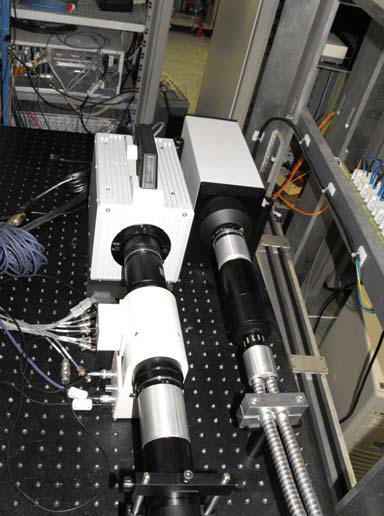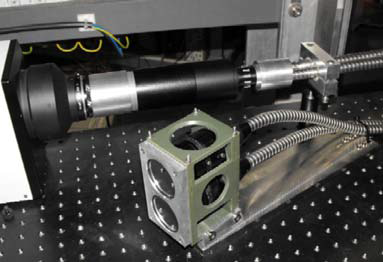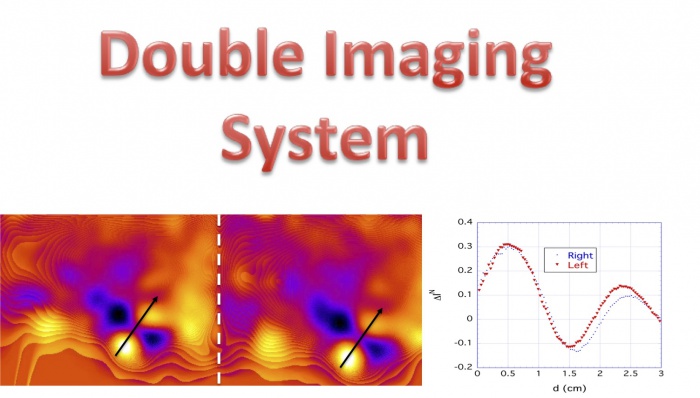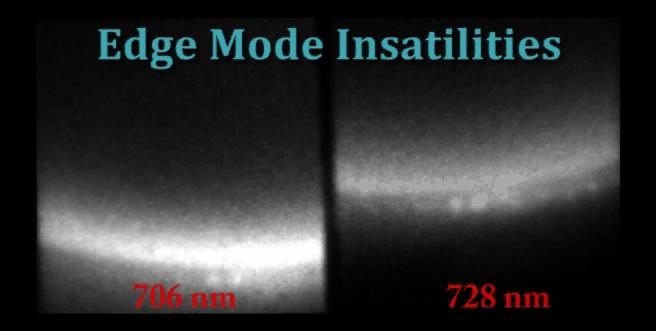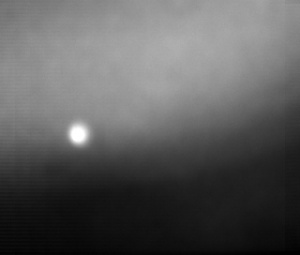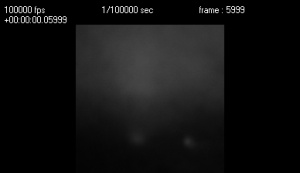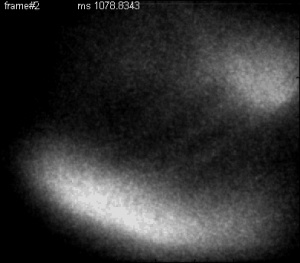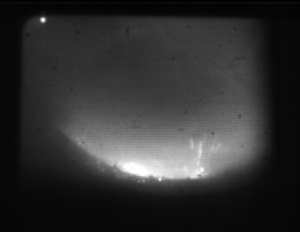TJ-II:Fast camera: Difference between revisions
No edit summary |
No edit summary |
||
| Line 26: | Line 26: | ||
[[File:camaras1.png]] | [[File:camaras1.png]] | ||
[[File:camaras2.png]] | [[File:camaras2.png|700px|]] | ||
== Image Intensifier for Fast Camera== | == Image Intensifier for Fast Camera== | ||
| Line 38: | Line 38: | ||
Below are some examples of movies recorded with the fast camera system of TJ-II. Click on the images to see the corresponding movie. | Below are some examples of movies recorded with the fast camera system of TJ-II. Click on the images to see the corresponding movie. | ||
=== Double imaging to visualize the fine structure of Blobs=== | === Double imaging to visualize the fine structure of Blobs<ref name="delaCal2"></ref>=== | ||
[[File:Double_Imaging.jpg| | [[File:Double_Imaging.jpg|700px|link=http://www-fusion.ciemat.es/fileshare/doc_exchange/camaras/video_DOUBLE_IMAGING.mp4]] | ||
A visible fast camera coupled with an image intensifier was employed to view turbulent coherent plasma structures (Blobs) at the gas plume being puffed through a poloidal limiter. The image intensifier amplifies the light intensity thereby allowing the imaging system to be operated at ultra-short exposure times down to 100 ns. | A visible fast camera coupled with an image intensifier was employed to view turbulent coherent plasma structures (Blobs) at the gas plume being puffed through a poloidal limiter. The image intensifier amplifies the light intensity thereby allowing the imaging system to be operated at ultra-short exposure times down to 100 ns. | ||
To distinguish real physical signal from noise we get two simultaneous images with the same view and compare them. We call this Double Imaging technique and it allowed us to validate the detected blob shape to scales down to a few millimetres, limited by our optical resolution. | To distinguish real physical signal from noise we get two simultaneous images with the same view and compare them. We call this Double Imaging technique and it allowed us to validate the detected blob shape to scales down to a few millimetres, limited by our optical resolution. | ||
=== | === Two-dimensional imaging of n<sub>e</sub> and T<sub>e</sub><ref name="delaCal4"></ref>=== | ||
[[File:25623wComm_Photo000001.jpg| | [[File:25623wComm_Photo000001.jpg|700px|link=http://www-fusion.ciemat.es/camaras/25623wComm.avi|Limiter recycling movie]] | ||
An intensified visible camera looks tangentially at a poloidal limiter where helium recycles, acting as a wide neutral source, and the atomic line emission due to plasma excitation becomes strongly localized there. It includes a bifurcated coherent bundle, each end with a different interference filter to select helium atomic lines, so that two simultaneous filtered images are captured in one single frame. The object of the proposed technique is to apply the well-known helium-beam line-ratio technique to obtain from selected filtered images the two-dimensional (2D) edge plasma n<sub>e</sub> and T<sub>e</sub>. | |||
=== Limiter Recycling === | === Limiter Recycling === | ||
Revision as of 11:00, 22 April 2015
TJ-II disposes of various fast camera systems for plasma imaging, a detailed description can be found elsewhere. [1].
Different topics have been studied such as Turbulence [2] [3] [4], Dust [5], or Spectroscopic 2-Dimensional Te and ne imaging, [6]
The main system is located in sector B8, port B8TANG, viewing the poloidal limiter in sector C3 tangentially.
The TJ-II Visible Camera Team has installed in collaboration with NIFS (Japan) a Fast Camera in LHD Stellarator [7].
In the framework of EUROFUSION program, the group has leaded the installation and operation of the KL8 Wide Angle Visible Fast Camera in JET Tokamak (UK).
The latest upgrade and experiments with the ITER like Wall (ILW) are described elsewhere [8].
Cameras
Three Photron Fast Cameras (APX-RS and SA1) are employed at TJ-II Photron. Sampling speed (measured in frames per second, fps) and image size can be selected depending on active area of the MOS sensor, but there is a trade-off: 5000 fps with 1024 x 1024 pixels(full frame) and up to 200000 fps (maximum ever employed so far) with 182 x 80 pixels The dynamic range of the sensor is 8 bits, and the memory size is 8 GB.
Image Intensifier for Fast Camera
The coupling of an image intensifier to a High-speed camera is not trivial, since relatively high light intensity fluxes, sufficient for short exposure times down to the µs range, are captured continuously for a long time period, typically of up to some seconds. As is well known, imageintensifiers (as photomultipliers) are vulnerable to this combination and if not operated correctly, they can be damaged. Moreover, not only the amplification factor is important, but also the image quality and the responselinearity. Two Hamamatsu image intensifiers (C9548-03BL and C10880) [1] were tested and are successfully operated. They are two stage intensifier, including a first GEN II stage with a fast phosphor (P-46) and gain adjustable via the voltage at the MCP, and a second GEN I one (booster) with a fixed gain of 50. Both stages are optically coupled by a Fiber Optic Plate (FOP) which transfers the output signal from the first to the second. Their linear response is guaranteed up to 200000 fps speed.

Videos
Below are some examples of movies recorded with the fast camera system of TJ-II. Click on the images to see the corresponding movie.
Double imaging to visualize the fine structure of Blobs[4]
A visible fast camera coupled with an image intensifier was employed to view turbulent coherent plasma structures (Blobs) at the gas plume being puffed through a poloidal limiter. The image intensifier amplifies the light intensity thereby allowing the imaging system to be operated at ultra-short exposure times down to 100 ns. To distinguish real physical signal from noise we get two simultaneous images with the same view and compare them. We call this Double Imaging technique and it allowed us to validate the detected blob shape to scales down to a few millimetres, limited by our optical resolution.
Two-dimensional imaging of ne and Te[6]
An intensified visible camera looks tangentially at a poloidal limiter where helium recycles, acting as a wide neutral source, and the atomic line emission due to plasma excitation becomes strongly localized there. It includes a bifurcated coherent bundle, each end with a different interference filter to select helium atomic lines, so that two simultaneous filtered images are captured in one single frame. The object of the proposed technique is to apply the well-known helium-beam line-ratio technique to obtain from selected filtered images the two-dimensional (2D) edge plasma ne and Te.
Limiter Recycling
Without filter and 75 mm lens. Speed: 54000 fps. Exposure time: 9μs. V: 650 V. ECH plasma with <ne> = 5x1018 m-3. Recycling at limiter positioned on the LCFS. The bright spot is Blackbody radiation from a glowing Langmuir probe on the limiter corner.
Helium Puffing
Without filter and 75 mm lens. Speed: 100000 fps. Exposure time: 1μs. V: 700 V. ECH plasma with <ne> = 5x1018 m-3. Helium puffing through the limiter 35 mm outside LCFS.
Lithium emission (Li I filter)
TJ-II plasma observed from a tangential port at 17.5 kHz sampling rate, with a lithium filter and image intensifier. In the field of view, the two most prominent areas of plasma-wall interaction can be seen: the poloidal limiter (lower) and the hardcore (helical limiter). As the plasma transits form ECH to NBI plasmas, the interaction level diminishes and becomes predominantly centered in the limiter. [3] From the lithium emission fluctuations information on the electron density fluctuations can be gained. [1]
Dust Visualisation [5]
Dust is observed in the TJ-II stellarator with a fast camera equipped with a bifurcated coherent fibre-bundle system that allows different set-ups such as dual filtering of atomic lines or a stereoscopic view to obtain tangential and perpendicular (to the magnetic field) observations simultaneously. The camera looks to a poloidal limiter that can be biased and it is observed that when a negative voltage is applied, dust from the limiter is ejected intensely once a certain threshold voltage is exceeded.
[[File:Dust.png|300px|link=http://www-fusion.ciemat.es/quixplorer/video_delaCal_dust copia.wmv]
First insertion of the poloidal limiter after a lithiation of the vacuum vessel. Tangential observation, 15 kHz sampling rate. The ejection of lithium flakes from the carbon surface can be seen clearly at the beginning of the discharge. At the end of the video, as the plasma becomes colder, the flakes penetrate deeper into it until they float freely in the post-discharge plasmoid.
References
- ↑ 1.0 1.1 E. de la Cal et al, The visible intensified cameras for plasma imaging in the TJ-II stellarator, Contrib. Plasma Phys. (2010)
- ↑ J.A. Alonso et al, Impact of different confinement regimes on the two-dimensional structure of edge turbulence, Plasma Phys. Control. Fusion 48 (2006) B465-B473
- ↑ 3.0 3.1 D. Carralero et al, Turbulence studies by fast camera imaging experiments in the TJII stellarator, Journal of Nuclear Materials 390-391 (2009) 457-460
- ↑ 4.0 4.1 E. de la Cal et al, Double imaging with an intensified visible fast camera to visualize the fine structure of turbulent coherent plasma structures (blobs) in TJ-II, 2014 Plasma Phys. Control. Fusion 56 105003)
- ↑ 5.0 5.1 E. de la Cal et al, Dust observation with a visible fast camera in the TJ-II stellarator, 2013 Plasma Phys. Control. Fusion 55 065001 )
- ↑ 6.0 6.1 E. de la Cal et al, Two-dimensional imaging of edge plasma electron density and temperature by the passive helium emission ratio technique in TJ-II, 2011 Plasma Phys. Control. Fusion 53, 085006
- ↑ M. Shoji et al et al, Tangentially Viewing Fast Camera Measurements in Core Density Collapse in LHD Stellarator, Annual Report of National Institute for Fusion Science 2010
- ↑ E. de la Cal et al et al, The Visible Intensified Fast Camera with Wide-angle view of JET ILW experiment, 39th EPS Conference & 16th Int. Congress on Plasma Physics P5.041
